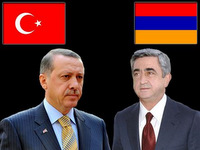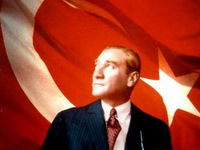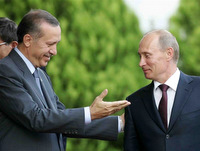
The fact that a meeting of NATO countries on the issues of strategy in Afghanistan in early February was held in Turkey's Istanbul looks symbolic enough. Turkey as a member of the Euro-Atlantic Alliance is the most eastern of its member countries not only geographically, but it is closest to the Muslim East by mentality. On the other hand, Turkey aims to join the EU, though it faces the resistance from some countries, first of all France. Istanbul – the former Constantinople – is officially included on the list of the European Capitals of Culture this year. As we know, the city is located in the western part of Turkey and, what's more important, is not only a treasury of Islamic religion and culture, but also one of the historic centers of Christian Civilization.
Turkish euronews
Considering the huge role of Turkey in the modern world, and especially – in European politics, a well known TV channel Euronews with headquarters in France started broadcasting in Turkish language on January 30. Thus, to the eight channels that broadcast in different European languages the ninth one was added. It appears to be absolutely not accidental that the interview with the Turkish Prime Minister Tayyip Erdogan was broadcasted on Euronews the same day.
He started his answers with a sharp criticism of European politicians (first of all, of the French President Sarkozy), whom he blamed for an unfair position in relation to the Turkish Republic and for attempts to force the republic into a corner.
Erdogan accused the EU of the fact that the situation in Cyprus came to a standstill because of the one-sided, in his view, support to Southern Cyprus to the prejudice of Northern Cyprus. More fundamental critique also sounded in the course of the interview. According to Erdogan, the EU shouldn't be a "Christian club" and shouldn't participate in the "campaign of Islamophobia." The Prime Minister stressed that he opposes anti-Semitism and considers it "a crime against humanity," but as a Muslim he will never accept anti-Islamism. Responsibility for the recent diplomatic incident, which resulted in Israeli party having to apologize for the disrespect expressed over an ambassador of Turkey, Erdogan fully assigned to Israel. Besides, he hinted that the government of that country will be sorry for its careless (as the Turkish prime minister phrased it) criticism of its great neighbor. He condemned the actions of the Israeli army during the armed conflict in the Gaza Strip – in particular, the use of phosphorous bombs against the civilian Palestinian population. However, in the same interview the Prime Minister rejected all criticism in connection to the Kurds’ position in Turkey and forceful actions of the state against them. Erdogan called Kurds "a part of the Turkish nation." (But do Kurdish people, who live in the territory of three countries – Iran, Iraq and Turkey – agree with that statement?)
Finally, the Prime Minister of Turkey has actually sidestepped the question about the possible effect of the Armenian Constitutional Court's interpretation of the Turkish-Armenian protocols aimed at normalizing the relations between the two countries.
Everything went wrong
 According to Erdogan, "everything apparently went wrong from the beginning." Turkey, he said, fulfilled its obligations under the protocols. So now is the turn for the Armenian party.
According to Erdogan, "everything apparently went wrong from the beginning." Turkey, he said, fulfilled its obligations under the protocols. So now is the turn for the Armenian party.
It is worth mentioning that "the football diplomacy" of Armenia and Turkey (when the head of the Turkish state visited a football match between the two national teams in Yerevan, and then in response the Armenian President came to the match in Turkey) aimed at the restoration of the official relations between the two states came to a standstill some time ago.
The foreign ministers of Armenia and Turkey signed the protocols on normalization of the relations between the two countries October 10 last year in Zurich. According to the protocols signed in the presence of the foreign ministers of France, Russia, Switzerland and the USA, there should be diplomatic relations established between the two countries, and Armenian-Turkish state border (closed in 1992) should be opened.
January 12 this year Armenia's Constitutional Court stated the protocols correspond to the Constitution. However, the court made a number of clarifications at that. Firstly, it emphasized that the mutual obligations within the entered international commitments are purely bilateral in nature and may not be "attributed to the relationships with any third party." That is, the Constitutional Court made it clear that these protocols can't be connected to the problem of Nagorno-Karabakh (because of which the war started between Armenia and Azerbaijan, whose side Ankara has taken.) Secondly, the court came to a conclusion that the Armenian-Turkish protocols can't be applied in a way "to come into conflict with the provisions of the preamble of the Constitution of Armenia and the 11th paragraph of the Declaration of Independence of the Republic of Armenia." This paragraph states that Armenia advocates for the international recognition of the 1915 Genocide of Armenians in Ottoman Turkey.
In response to these "stipulations" the current Turkish government accused Yerevan of imposing preconditions for the implementation of the protocols and thus – in non-compliance with the 'road map' by the Armenian party.
 Considering the opposite approaches of the two parties to that problem, the intention of the Prime Minister of Turkey Erdogan to avoid the discussion of too unpleasant topics in a brief interview with Euronews is completely understandable. And there is yet another circumstance to notice. The International Holocaust Remembrance Day was marked three days before the mentioned interview. On that day 65 years ago the Soviet Army liberated the surviving prisoners of Nazi death camp Auschwitz. It is necessary to say that memorial events dedicated to the matter were quite modestly covered on Euronews channel. (Live broadcast from the Polish museum in Auschwitz with the participation of the supreme leaders of Poland and the European Parliament, as well as the Prime Minister of Israel, was reduced to a minimum.) Russian TV channels marked the event even more "modestly" – they preferred to do without the words "Holocaust" and "genocide of the Jews" in their reports at all.
Considering the opposite approaches of the two parties to that problem, the intention of the Prime Minister of Turkey Erdogan to avoid the discussion of too unpleasant topics in a brief interview with Euronews is completely understandable. And there is yet another circumstance to notice. The International Holocaust Remembrance Day was marked three days before the mentioned interview. On that day 65 years ago the Soviet Army liberated the surviving prisoners of Nazi death camp Auschwitz. It is necessary to say that memorial events dedicated to the matter were quite modestly covered on Euronews channel. (Live broadcast from the Polish museum in Auschwitz with the participation of the supreme leaders of Poland and the European Parliament, as well as the Prime Minister of Israel, was reduced to a minimum.) Russian TV channels marked the event even more "modestly" – they preferred to do without the words "Holocaust" and "genocide of the Jews" in their reports at all.
In this connection, it is noteworthy that as "a crime against humanity" Erdogan in his interview mentions "anti-Semitism," not generally the genocide, for which the Nazi war criminals where
executed in Nuremberg. It is unlikely that we can talk about an interpreter’s blunder. The Prime Minister of Turkey seems to have tried avoiding the very word "genocide," because the Armenian party is talking specifically about the recognition of the mass genocide against the Armenians.
Waiting for an apology
Turkey categorically disagrees with this interpretation; its representatives say that in the conditions of war there were victims on both sides.
But Yerevan insists on the recognition of genocide during the 1st World War, when, according to various estimates, half a million to two million Armenians were destroyed. Moreover, many historians call the events of 1915 the first genocide of the 20th century. According to their opinion, the absence of a sharp moral condemnation of those events from the world community made it possible for the Holocaust to happen during the 2nd World War.
True, the Entente and the United States adopted a series of resolutions condemning the massacres of Armenians, and Russia even really helped the nation. Under the orders of Emperor Nicholas II Russian troops rescued 375 000 people from death. But stopping the destruction of Armenian population in Turkey failed.
April 24, 1915, when the leadership of the Young Turks ordered to collect all Armenian intellectuals in Constantinople and start their forcible deportation, is considered the beginning of "Armenian massacres." The massacre, which ended in September 1918, was accompanied by burning people alive, sexual violence and abuse. Hundreds of Armenian Orthodox churches and monasteries, as well as monuments of Armenian culture, were destroyed on the territory of Turkey.
 On the other hand, it should be noted that Turkey during the First World War was going through the process of establishing a new independent state on the place of the decayed Ottoman Empire. The process of reforming the Turkish society and the Turkish state was led precisely by the mentioned Young Turks. It so happened that just five years after the Armenian massacres Mustafa Kemal Ataturk, who is rightfully considered the father of the nation (as it is reflected in his nickname,) came to power. In March 1920, after expelling the British from Istambul, Ataturk gathered Grand National Assembly in Ankara, which on April 23 made him the Speaker of the Parliament and the head of the government. This was the start for the Turkish Republic in its current form.
On the other hand, it should be noted that Turkey during the First World War was going through the process of establishing a new independent state on the place of the decayed Ottoman Empire. The process of reforming the Turkish society and the Turkish state was led precisely by the mentioned Young Turks. It so happened that just five years after the Armenian massacres Mustafa Kemal Ataturk, who is rightfully considered the father of the nation (as it is reflected in his nickname,) came to power. In March 1920, after expelling the British from Istambul, Ataturk gathered Grand National Assembly in Ankara, which on April 23 made him the Speaker of the Parliament and the head of the government. This was the start for the Turkish Republic in its current form.
Ataturk led what in Turkey is called the national liberation war against Greece (that war was also accompanied by slaughter of Christians.) At the same time, Ataturk forcibly transferred Turkish language to Latin characters and westernized the country, making education and power secular, significantly extending civil rights, including the rights of women.
All changes in Turkish Republic where happening under the flag of nationalism, with all the subsequent excesses. Therefore, when Polish authorities condemn Victor Yushchenko's decree on awarding the title of the Hero of Ukraine to Stepan Bandera, the leader of Ukrainian nationalists during the Second World War, they should remember that the revival of the Polish state in 1918 also took place under the clearly expressed national slogans. And that the extreme manifestations of anti-Semitism were repeatedly noted in Poland in the interwar period, and especially – in times of war. Fortunately, after the fall of communism Poland managed to overcome this legacy of the past to a large extent. Now the positions of the Polish and German authorities regarding the Holocaust, as well as in most countries of the European Union, almost don't vary.
Is there any hope that Turkey, as its difficult but processive movement towards the EU membership goes on, will be getting more civilized? There is no doubt about that. It is important that changes gradually take place in Turkish society itself. In December 2008 Turkish intellectuals launched a campaign under the slogan "Armenians, forgive us!" on Sorry! website. About 11 thousand people signed the petition with the website’s appeal by early February this year. However, another group of Turkish citizens started a counter-campaign on the Internet, and has already gathered 117 thousand supporters. Anti-Armenian website We are waiting for apology posted materials dedicated to the massacre in Khojaly in Azerbaijan.
The prosecution filed a criminal case against the authors of the call "Armenians, forgive us!" However, the criminal court in Ankara decided to refrain from the case against the creators of the website.
Painful step
 As to the current international policies of Turkey, they look mixed. This year several meetings were held between Erdogan and Russia's President Medvedev and Prime Minister Putin. The talk is about energy cooperation. In particular, Turkish Prime Minister hinted that his country is ready to participate in the construction of Russia's pipeline "South Stream" from Russia to Europe. Moreover, Vice-Premier Sechin and Minister of Energy and Natural Resources of Turkey Taner Yildiz made a joint statement about the intention to build a nuclear power plant in Turkey with joint efforts. That is directly or indirectly aimed against the EU’s energy policy. Both Russia and Turkey would like to be less dependent on Brussels, though for different reasons.
As to the current international policies of Turkey, they look mixed. This year several meetings were held between Erdogan and Russia's President Medvedev and Prime Minister Putin. The talk is about energy cooperation. In particular, Turkish Prime Minister hinted that his country is ready to participate in the construction of Russia's pipeline "South Stream" from Russia to Europe. Moreover, Vice-Premier Sechin and Minister of Energy and Natural Resources of Turkey Taner Yildiz made a joint statement about the intention to build a nuclear power plant in Turkey with joint efforts. That is directly or indirectly aimed against the EU’s energy policy. Both Russia and Turkey would like to be less dependent on Brussels, though for different reasons.
In this respect, anti-Turkish statements by politicians like Sarkozy or Berlusconi don't look very thoughtful and far-sighted. However, Ankara's rapprochement with Moscow on certain items looks temporary and not very natural. And the thing is not only about the historical past of the two empires, which, to put it mildly, was not unshadowed for centuries. Turkey occupies an important strategic place in the Euro-Atlantic security. And it's hard to imagine that a many years member of NATO would suddenly decide to sacrifice its strategic partnership with Washington in favor of inconsistent and unpredictable Moscow (much more unpredictable and ambiguous in its politics than Brussels.) Moreover, Washington, no matter who occupies the presidential chair in the White House, can't afford losing such a key partner in Eurasia as Turkey.
Nevertheless, as it was announced, the US Congress will consider the issue of condemnation of the Armenian genocide on March 4. Would that complicate American-Turkish relations? Wouldn't such recognition cool the aspiration of Turkey towards EU membership and Western values in general? The answer largely depends on Turkish citizens themselves. At one time, the acknowledgment of the Holocaust in Germany didn't affect its position and prestige in the Western world and its economic and cultural development. Quite the opposite – it helped Germans to move from the complex issues of the past, which hindered the progress of the society, to more pressing issues of today, to setting new objectives. That was a painful, but ethically and psychologically necessary step. Would Ankara be able to enter a new phase of politics, could it think and act in a western way? We shall see.


